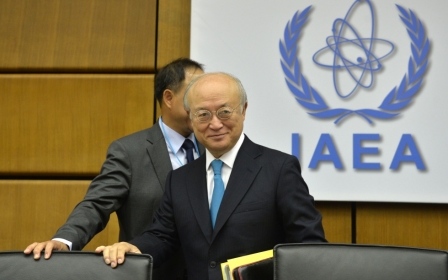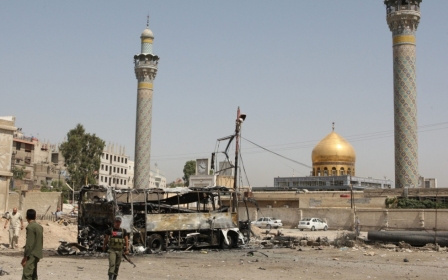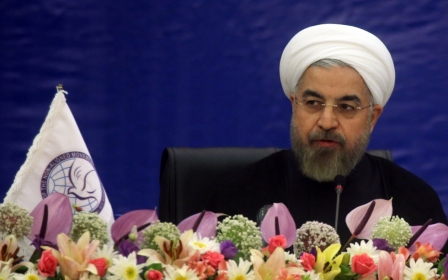Iran 'will arm Palestinians' after Israeli drone downed

Tehran will "accelerate" arming Palestinians in the occupied West Bank in retaliation for Israel deploying a spy drone over Iran, which was shot down, a military commander said on Monday.
"We will accelerate the arming of the West Bank and we reserve the right to give any response," said General Amir-Ali Hajizadeh, commander of aerial forces of Iran's elite Revolutionary Guards, in a statement on their official website, sephanews.com.
The warning comes a day after the Guards said they had brought down an Israeli stealth drone above the Natanz uranium enrichment site in the centre of the country.
"A spy drone of the Zionist regime (Israel) was brought down by a missile... This stealth drone was trying to approach the Natanz nuclear zone," the corps said in a statement on sepahnews.com
"This act demonstrates a new adventurism by the Zionist regime... The Revolutionary Guard and the other armed forces reserve the right to respond to this act," the statement added.
Natanz is Iran's main uranium enrichment site, housing more than 16,000 centrifuges. Around 3,000 more are at the Fordo plant, buried inside a mountain and hard to destroy.
Israel has often threatened to attack Iranian nuclear installations.
Iran and the P5+1 powers - Britain, China, France, Russia, the United States and Germany - reached a six-month interim agreement under which Iran suspended part of its nuclear activities in return for a partial lifting of international sanctions.
In July, that deal was extended by four months until 24 November to give the two sides more time to negotiate a final accord aimed at ending 10 years of tensions over Iran's nuclear programme.
The sides remain split on how much uranium enrichment Iran should be allowed to carry out.
Washington wants Tehran to slash its programme by three-quarters, but Iran wants to expand enrichment ten-fold by 2021, chiefly to produce fuel for its Bushehr nuclear power plant.
Israel, a sworn enemy of Iran, opposes any agreement allowing Tehran to keep part of its uranium enrichment programme, saying Iran could use the material to make an atomic bomb.
Iran has consistently denied wanting to make nuclear weapons.
Iran unveils new missiles, drones
This comes on the same day that Iran has unveiled two new missiles and two new drones it said have been added to its arsenal, in a ceremony attended by President Hassan Rouhani.
The Ghadir (Mighty), with a range of 300 kilometres (185 miles), is a ground-to-sea and sea-to-sea missile, the official IRNA news agency said.
It is in the same family as the Ghader or Qader cruise missile, which has a range of 200 kilometres.
The other missile unveiled on Sunday, the Nasr-e Basir (Clear Victory), is equipped with a seeker homing head. Its range was not given.
The new Karar-4 (Striker) drone can track and monitor enemy aircraft, the agency said, while the Mohajer-4 (Migrant) drone is designed to perform photographic and mapping missions.
Iran has developed a major missile programme in addition to producing different types of Unmanned Aerial Vehicles (UAVs), including attack drones.
The United States, whose Fifth Fleet is based in Sunni-ruled Bahrain across the Gulf from the mainly Shiite Islamic republic, has repeatedly expressed concern about these two programmes.
Rouhani on Sunday sought to allay such fears.
"Iran has no intention to interfere in, dominate or attack other countries or plunder their resources," he said in a speech broadcast on state television, adding that the country's military doctrine was defensive.
"But at the same time we will stand up to any aggression," he added.
In May, Iran said it had succeeded in copying an American RQ-170 Sentinel drone that it forced down and recovered nearly intact in December 2011.
New MEE newsletter: Jerusalem Dispatch
Sign up to get the latest insights and analysis on Israel-Palestine, alongside Turkey Unpacked and other MEE newsletters
Middle East Eye delivers independent and unrivalled coverage and analysis of the Middle East, North Africa and beyond. To learn more about republishing this content and the associated fees, please fill out this form. More about MEE can be found here.




